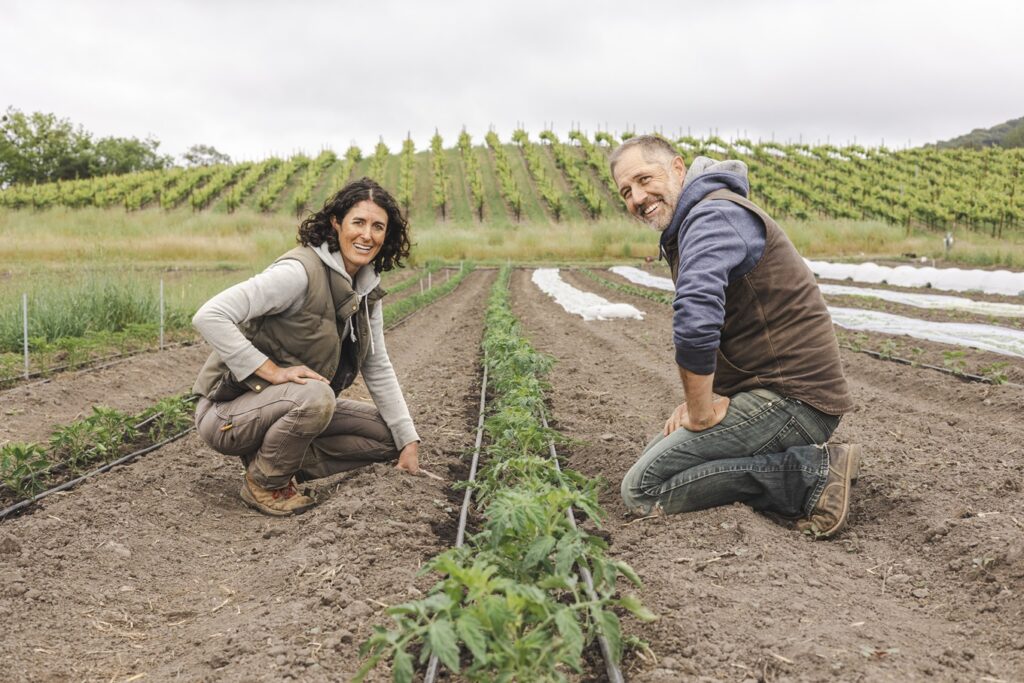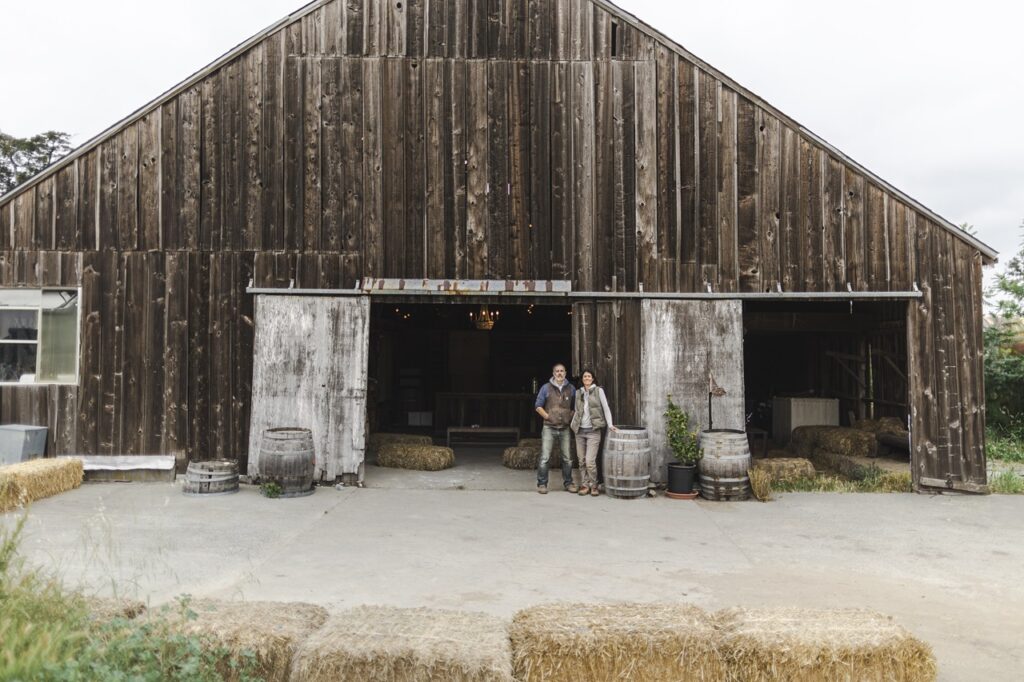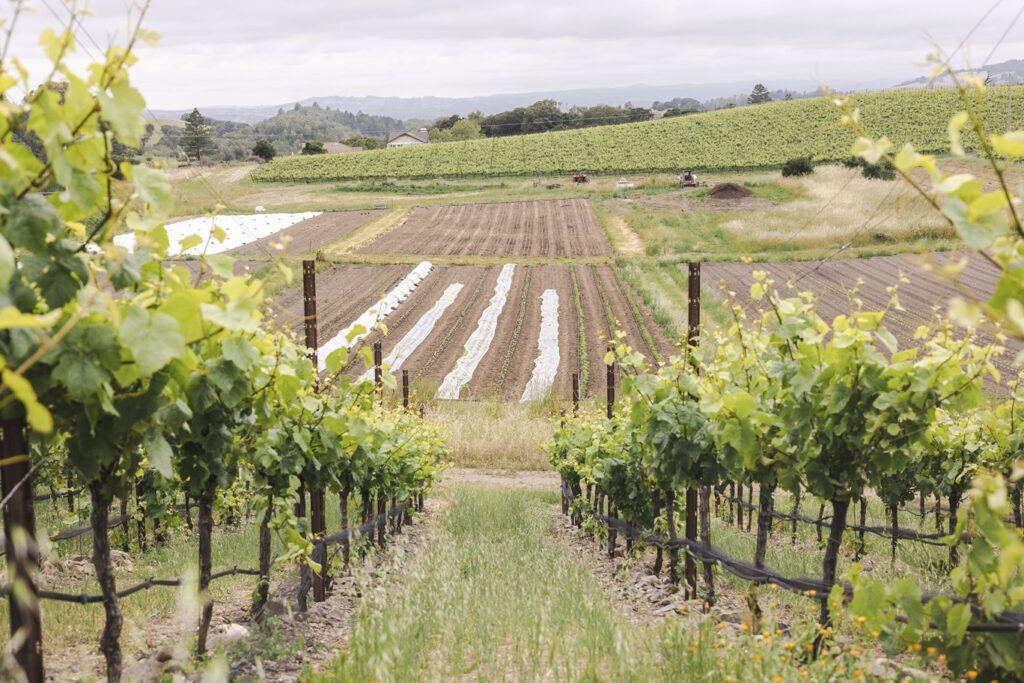Kibo Farm Looks to a Cooperative Model to Address Land Access, Sustainability, and Stewardship
PHOTOS: KELSEY JOY PHOTOGRAPHY
It would be hard to deny that Kibo Farm is picturesque. At modest altitude on Sonoma Mountain, a mezzanine of clouds hangs particularly low on the day of my visit. Gangly snowy egrets take flight from an adjacent pond and stand out in stark contrast against a darkened sky. The cultivated fields lay surrounded by an orchard and grapevines on the hillsides. It is here that Jenny and Vince Trotter and their farm crew grow mixed vegetables and fruit trees on four acres, a little over half of which is now resting, tucked in with cover crop for the winter.
And while Santa Rosa’s Kibo Farm stands out on its own with the gorgeous produce and other products made from what they grow, the Trotters rely and thrive on collaborative relationships they have forged. The land is leased from winemaker Belden Barns. The Farm works closely with local chefs to synchronize menus with crop planning. Part of FEED Cooperative’s inaugural cohort of members, the Trotters understand the importance of collaboration among small farms and businesses and embrace the spirit of working together to care for land and community. Seeking shelter in the barn from a pelting rain, we sat down and talked more about farming, the issues of small agriculture today, and how, for some, feeding people is a love language.
LP (Lauren Papalia): Kibo Farm’s crops are nestled in a bowl, surrounded on three sides by Belden Barns grapevines. Can you describe some of the nuances of your topography and the challenges and advantages that come with it?
KF (Kibo Farm): Our fields sit in a low spot on the property, which acts as a catchment basin for the winter rains that eventually flow into our irrigation pond. This has brought us rich topsoil from the surrounding hills, but it also leaves our fields soggy well into the spring, making it harder to get a jump on things. The property itself sits nearly 1,000 feet up the northwestern flank of Sonoma Mountain. The beauty of this spot is that we rarely, if ever, get frost. Our lemon, mandarin, lime, and yuzu trees love it!
LP: Kibo Farm was part of the inaugural cohort of co-op members at FEED and, Jenny, as former board president, you played an integral part in FEED’s transition to a co-op. What would you say are some of the greatest challenges and benefits to structuring an organization in this way?
KF: There are many benefits to the co-op model, most importantly, that the key stakeholders have a voice in how the business operates. As small, independently owned farms linked together through FEED, we can get more food to more people and create a more resilient food system. Of course, there are always challenges with shared ownership. Having this many stakeholders requires setting up clear systems, procedures, and good channels of communication at every level.
LP: What do you find most rewarding about farming?
KF: Hands down, it is the pleasure of feeding people. That may sound corny, but if you’ve ever experienced a high from watching friends or family enjoy a delicious meal that you prepared, multiply that by 10 and you will understand.
LP: What’s something you wish more people knew about farming?
KF: Over the last 20 years, farming has been glamorized to the point where some farmers enjoy a near-celebrity status. This elevated profile of agriculture has helped find new markets and reach new customers. But, along the way, people tend to forget that this is a business that must support the people who do it, or it will disappear.
LP: Yes, and in a place as pricey as Sonoma County, it’s challenging for farms to offer workers a living wage.
KF: Every farm is a small business struggling to stay alive. Many of us work second jobs, underscoring the difficult economics of producing food. Across the U.S., the average farm makes less than 25% of their income from revenue generated on the farm. The bulk of what they need comes from second, third and fourth jobs.
LP: I think this really highlights the conundrum/paradox of sustainable agriculture. The USDA reports small holdings like Kibo account for over 90% of all farms but only 15% of overall market value of agricultural production. How do we make small farms more socially and economically sustainable?
KF: We have to work together to solve problems like the high cost of land and land access. We have to increase the amount of affordable housing and raise expectations for how much food should cost. We need to find ways to compensate farmers and ranchers, not just for their products but for the ecosystem services they provide to the community as a whole: sequestering carbon in the ground, converting food waste into soil-enriching compost, etc. We would happily trade some of the glamor for a more genuine accounting of our labors.
In terms of solutions, cooperative ownership models certainly can play a significant part. Cooperative ownership of land could be an interesting solution in competitive regions like ours. And cooperative housing has provided communities elsewhere with a means to lower-cost living. Co-ops aren’t magic bullets, but we could probably be making better use of the model than we are now.
LP: What is your vision for the farm’s future? What are you most excited or hopeful about?
KF: One unique aspect of our farm business is the interdependent relationships we’ve built with chefs in the Bay Area. For several restaurants, we sit down each winter, pore over seed catalogs, and talk about all the new things we’d like to try. With this kind of close-knit relationship comes security, which allows us to take risks and deliver items to these chefs that they might not find anywhere else. Having partners who value what we do inspires us and injects every spring with a spirit of excitement.
Lauren Papalia is part of FEED Cooperative’s marketing team, a writer, and a part-time farmer.



